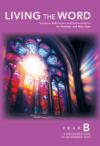Scripture Study for
Fifth Sunday of Easter
Acts 14:21–27 / Psalm 145:1 / Revelation 21:1–5a / John 13:31–33a, 34–35
<< Back to LECTIONARY RESOURCES
Understanding the Word
By Br. John R. Barker, OFM
Having traveled for some time proclaiming the gospel and making disciples, Paul and Barnabas now return home, reversing course and revisiting earlier regions. They emphasize to these fledgling Christian communities that their discipleship will bring hardship, but that this is a necessary result of their fidelity to God. They also serve the communities by appointing religious leaders (presbyters), who will guide and strengthen them. Upon returning home to Antioch (of Syria), the apostles report with great joy what God has done in extending his gifts to the Gentiles. So ends Paul’s first mission to the Gentiles, which has already borne great fruit by spreading the gospel throughout much of the Mediterranean world.
The book of Revelation culminates with a dramatic scene of recreation, in which everything is renewed by God. All of the damage done to God’s creation through human sin and violence is undone or transformed in God’s new creation. The sea is a common scriptural metaphor for chaos, the hostile forces in the world that oppose God’s creation. That it is “no more” indicates the final conquest of chaos and the definitive triumph of God’s saving will for all of creation. The old order has passed away, death and mourning are no more as God “makes all things new.” The heavenly Jerusalem, as it often does in the Old Testament, represents God’s people. God will now dwell with the people (as God did originally in Eden); the estrangement between God and the people is now brought to an end.
In the Gospel of John, Jesus’ “glory” begins and is most clearly manifested in his death on the cross, an example of Johannine irony. The glory of Christ consists in his showing forth the Father, and in his death, he exhibits the Father’s love for what God has created. In this way he also glorifies God. Jesus and the Father thus glorify one another and are glorified in one another. The glory is in the divine love shown by both, and it is this love that Jesus insists his followers must also exemplify (and thus, we may say, give glory to both the Father and the Son). Those who meet them will know they are true disciples of Jesus not by their teaching but by their love, which is the true test of Christian discipleship.
